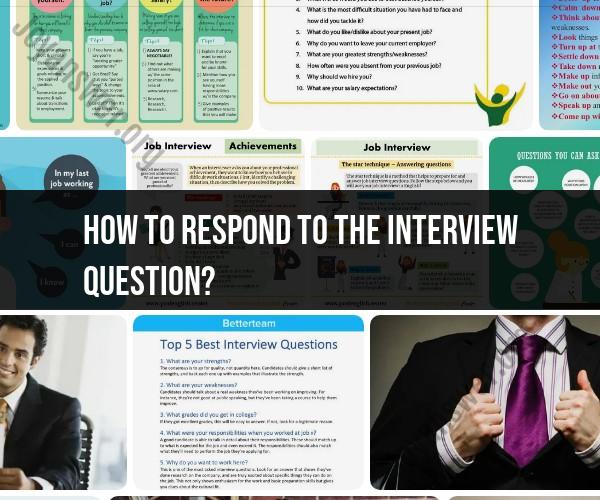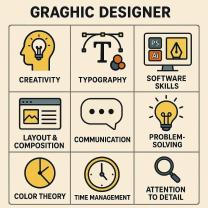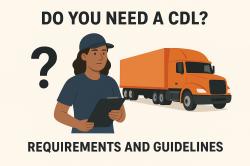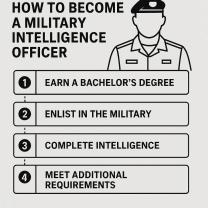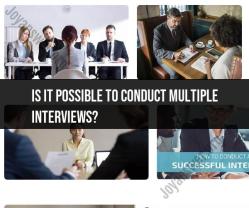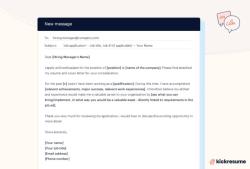How to respond to the interview question?
Responding effectively to interview questions is essential to make a positive impression on the interviewer and increase your chances of securing the job. Here are some techniques to help you respond to interview questions effectively:
Listen Carefully:
- Pay close attention to the interviewer's question. Ensure you understand the question before responding.
Take a Moment to Think:
- It's perfectly acceptable to take a brief pause before answering a question. Use this time to gather your thoughts and formulate a clear response.
Structure Your Responses:
- Use the STAR method (Situation, Task, Action, Result) for behavioral questions. Start by describing the situation or problem, explain the task or challenge, detail the actions you took, and conclude with the positive result or outcome.
Be Concise:
- Keep your responses focused and to the point. Avoid going off on tangents or providing excessive details that may overwhelm the interviewer.
Highlight Relevant Skills and Experiences:
- Tailor your responses to the specific job requirements. Emphasize your skills and experiences that align with the role you're interviewing for.
Use Examples:
- Whenever possible, support your answers with specific examples from your past experiences. Real-life examples help illustrate your qualifications.
Stay Positive:
- Maintain a positive tone throughout the interview. Avoid negative comments about previous employers or experiences.
Quantify Achievements:
- When discussing accomplishments, use numbers or data to quantify your achievements. This provides concrete evidence of your success.
Show Enthusiasm:
- Express enthusiasm for the role and the company. Let the interviewer know why you're excited about the opportunity.
Ask for Clarification (if needed):
- If a question is unclear or you need more context, don't hesitate to ask for clarification. It's better to seek clarity than to provide an irrelevant answer.
Avoid Rambling:
- Be mindful of the interview's time constraints. Answer questions thoroughly but succinctly to ensure you cover all relevant points.
Practice Active Listening:
- Demonstrate your engagement by nodding, making eye contact, and using verbal cues like "I see," or "That's an interesting point" when appropriate.
Stay Calm and Confident:
- Maintain your composure and self-confidence throughout the interview. If you're asked a challenging question, take a deep breath and respond calmly.
Adapt to Behavioral Questions:
- For behavioral questions that ask about past experiences, use the STAR method to structure your responses. This method ensures you provide complete answers with context and results.
Prepare for Common Questions:
- Practice responses to common interview questions beforehand, but avoid sounding rehearsed. Aim for a natural and conversational tone.
Address Weaknesses Positively:
- If asked about weaknesses, discuss areas where you've improved or are actively working to develop. Always end on a positive note by mentioning steps you've taken for improvement.
Be Authentic:
- Be yourself during the interview. Authenticity is valued by interviewers, and it helps build a genuine connection.
Follow Up:
- After providing a response, consider asking if the interviewer would like additional details or if your answer adequately addressed their question.
Practice:
- Conduct mock interviews with a friend or career coach to practice your responses. This can help you refine your answers and build confidence.
Reflect and Learn:
- After the interview, reflect on your performance and identify areas where you can improve. Use each interview as a learning experience for future opportunities.
Remember that interviewers are not only assessing your qualifications but also your communication skills, problem-solving abilities, and cultural fit with the company. Effective communication is a valuable skill that can set you apart in the interview process.
Crafting Effective Responses to Interview Questions
When crafting effective responses to interview questions, it is important to keep the following tips in mind:
- Be prepared. Research the company and the position you are interviewing for so that you can anticipate the types of questions you will be asked.
- Be clear and concise. Get to the point of your answer quickly and avoid rambling.
- Be specific. Provide examples from your work experience to support your answers.
- Be positive and enthusiastic. Even if you are asked about a weakness, try to frame it in a positive light.
- Be yourself. Don't try to be someone you're not. The interviewer wants to get to know the real you.
Here is an example of how to craft an effective response to the common interview question, "Tell me about yourself":
"I am a software engineer with five years of experience in developing web applications. I have a strong track record of delivering high-quality products on time and within budget. I am also a team player and I am always willing to go the extra mile. For example, in my previous role, I was tasked with developing a new customer relationship management (CRM) system for the company. I worked closely with the sales team to understand their needs and I was able to deliver a system that exceeded their expectations. I am excited about the opportunity to work at your company and I am confident that I can make a significant contribution to the team."
Navigating Interview Questions: Strategies for Providing Strong Answers
Here are some additional strategies for providing strong answers to interview questions:
- Listen carefully to the question. Make sure you understand what the interviewer is asking before you start answering.
- Take a moment to think about your answer. Don't feel pressured to give an answer right away. It's better to take a few seconds to collect your thoughts and give a thoughtful answer than to rush into an answer that you regret later.
- Use keywords. When you are answering the question, try to use the same keywords that the interviewer used in the question. This will show the interviewer that you are paying attention and that you understand what they are asking.
- Be honest and authentic. The interviewer wants to get to know the real you. Don't try to be someone you're not.
Winning Interview Responses: How to Impress Your Interviewer
Here are some tips for crafting winning interview responses that will impress your interviewer:
- Be specific and provide examples. When you are answering questions, be as specific as possible and provide examples from your work experience to support your answers. This will show the interviewer that you have the skills and experience they are looking for.
- Be positive and enthusiastic. Employers want to hire people who are excited about the job and the company. Show the interviewer that you are enthusiastic about the opportunity and that you are eager to learn and grow.
- Be confident. Confidence is key in a job interview. When you answer questions, speak clearly and confidently. Make eye contact with the interviewer and avoid fidgeting.
By following these tips, you can craft effective interview responses that will impress your interviewer and help you land the job.
